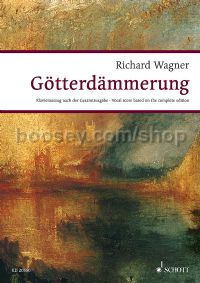Götterdämmerung (vocal score - complete edition)
Götterdämmerung (vocal score - complete edition)
* Estimated price converted from UK retail price
ED20550 - Richard Wagner Gotterdammerung. Vocal Score based on the Complete Edition.
In the tetralogy Der Ring des Nibelungen [The Ring of the Nibelung] which was subtitled by Wagner as “A stage festival play for three days and a preliminary evening”, Götterdämmerung [The Twilight of the Gods] forms the “third day” and therefore the fourth and final part. The history of the origins of this work spans the years 1848 and 1874, a period outwardly identical to the dates given for the history of the origins of the complete opera cycle. Götterdämmerung was indeed the first of the four operas to be begun – under a different title: Siegfried’s Tod [Siegfried’s Death], – and the last of the cycle to be completed. The beginning of work on this opera did however not mark the commencement of work on the tetralogy, as the idea for this cycle only emerged in the autumn of 1851.
When Wagner compiled the text book for Siegfried’s Tod in November 1848 while employed as court music director in Dresden, he initially only visualised the composition of a single opera. He continued to adhere to this concept even after his participation in the unsuccessful Dresden rebellion in 1849 which forced him to flee to Switzerland. He began the composition of Siegfried’s Tod in Zurich in the summer of 1850, but soon abandoned this project. Only a few months later in May 1851, he developed the concept of a two-part drama: Siegfried’s Tod was to be preceded by a second work entitled Der junge Siegfried [The Young Siegfried] (later to be known as Siegfried) which would give the project more depth and coherence, but even this extension was insufficient to fulfil Wagner’s dramatic and dramaturgic ambitions. He compiled initial text sketches for Das Rheingold [The Rhine Gold] and Die Walküre [The Valkyrie] in November 1851 and completed the text books for these operas by 1852. The concept of the three preceding operas naturally had repercussions for the planned fourth opera regarding content, prompting Wagner to undertake a comprehensive revision of Siegfried’s Tod in 1852; for this reason, this work must be considered as being far more than a mere preparatory form of Götterdämmerung, and is in fact an independent work in its own right.




